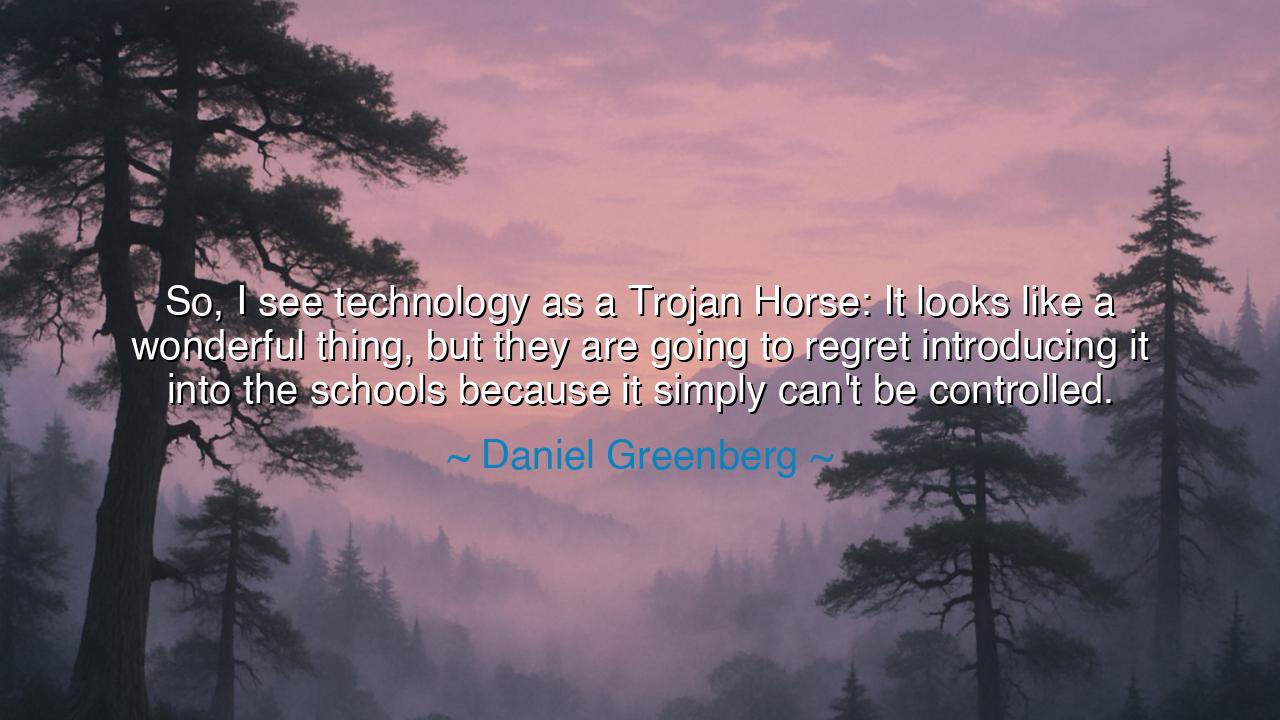
So, I see technology as a Trojan Horse: It looks like a
So, I see technology as a Trojan Horse: It looks like a wonderful thing, but they are going to regret introducing it into the schools because it simply can't be controlled.






Daniel Greenberg, the bold thinker on education and society, once warned with the sharpness of ancient prophecy: “So, I see technology as a Trojan Horse: It looks like a wonderful thing, but they are going to regret introducing it into the schools because it simply can’t be controlled.” In this image of the Trojan Horse, he evokes one of history’s most enduring lessons: that not everything shining at the gate is a gift, and not every blessing is without its shadow. His words ring with caution, for he saw in the eager embrace of technology in schools both promise and peril.
The Trojan Horse—a marvel of cunning—was presented by the Greeks to the people of Troy as a gift, a symbol of surrender. The Trojans, deceived by its beauty, brought it within their walls. Yet within its hollow heart were hidden warriors, who in the night opened the gates and brought ruin upon the city. In the same way, Greenberg warns that technology, though shining with promise, may harbor consequences unseen. It offers knowledge, access, and efficiency, but within it may also lie distraction, dependence, and the loss of control. What seems a gift can also become a gateway to unforeseen destruction.
When he speaks of schools, Greenberg points to the most sacred of human institutions: the training ground of minds. Here, the young are formed, character is shaped, wisdom is planted. To bring the Trojan Horse of technology into this realm is to risk surrendering the sanctuary of learning to forces that no teacher nor guardian can fully command. For technology opens not only doors to wisdom, but also doors to chaos—distraction, falsehood, the endless pull of screens. Like the Trojans who thought themselves victorious, educators may one day lament the moment they let this glittering gift inside.
History has shown us parallels to this truth. Consider the early days of television. It was heralded as the great teacher of the people, a window into culture and knowledge. Families welcomed it into their homes as a blessing. Yet, over time, it became not only a source of learning, but also of endless distraction, shallow entertainment, and even manipulation. The promise was real—but so too were the unforeseen costs. Television was a Trojan Horse: a gift that carried hidden armies within.
The deeper meaning of Greenberg’s words is not that technology is evil, but that it is untamable. Once released into the hands of the young, it cannot be bound by rules or locked into narrow uses. It carries within it not only tools of learning, but entire worlds of influence—social, cultural, and psychological. To believe one can fully control it is to fall prey to the same arrogance that blinded the Trojans. The wise do not forbid the horse entirely, but they open it with caution, understanding what lies inside before bringing it fully within their walls.
The lesson, then, is one of vigilance. Embrace the gifts of technology, but never blindly. Ask always: what warriors hide within this gift? What consequences might flow from its adoption? In schools, in homes, in our own lives, we must not be dazzled by the brightness of invention without considering its shadows. The path of wisdom is balance—welcoming what is good, but guarding against what may devour from within.
Therefore, I counsel you: let not your love of novelty blind you. Do not rush to bring every new device, every new tool, every glittering invention into the sacred spaces of learning and life. Examine carefully. Question deeply. Use with discipline. For technology, like fire, may warm the hearth or burn the house. Guard your gates, and let no Trojan Horse enter unexamined.
So let Daniel Greenberg’s warning echo through the generations: “Technology looks like a wonderful thing, but it cannot be controlled.” May his words teach us that the greatest danger is not the enemy at the gates, but the gift we invite within without wisdom. To live with technology is our destiny, but to live wisely with it is our choice.






AAdministratorAdministrator
Welcome, honored guests. Please leave a comment, we will respond soon